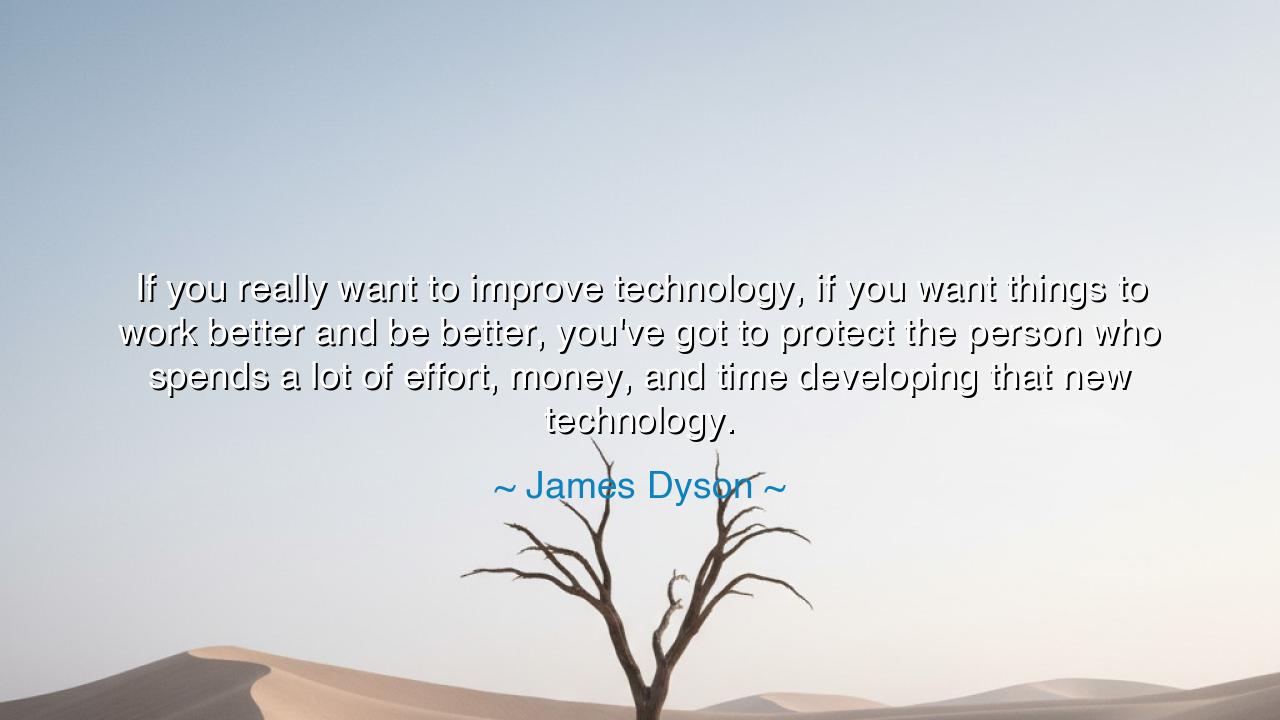
If you really want to improve technology, if you want things to
If you really want to improve technology, if you want things to work better and be better, you've got to protect the person who spends a lot of effort, money, and time developing that new technology.






James Dyson, a craftsman of invention and a warrior in the realm of design, declares with conviction: “If you really want to improve technology, if you want things to work better and be better, you’ve got to protect the person who spends a lot of effort, money, and time developing that new technology.” In this saying lies not merely the defense of the inventor, but the defense of progress itself. For every great leap forward is born not of chance, but of human toil, sacrifice, and vision. If such labor is left unguarded, the flame of innovation falters, and mankind loses the light that guides its path.
To improve technology is no simple task. It demands sleepless nights, countless failures, and the courage to persist when others have surrendered. Dyson himself built thousands of prototypes before creating the vacuum that would carry his name. He speaks as one who has walked the long road, who knows that every breakthrough is purchased at the cost of time, wealth, and heart. The inventor is like the farmer who sows in barren soil, trusting that one day the harvest will come. Yet without protection—without laws, respect, and support—others may come and seize the fruits before they ripen, leaving the farmer in ruin.
History has shown the need for such guardianship. Consider Thomas Edison, who labored to bring the electric light into the homes of millions. His triumph was not simply in invention, but in securing his right to it, lest his idea be stolen before it could transform the world. Or reflect upon the story of Leonardo da Vinci, whose visions of flying machines remained sketches because the age offered no structure to protect or fund such daring. When inventors are left defenseless, their dreams wither, and the march of progress slows. Thus Dyson’s plea: to protect the inventor is to protect the future.
But Dyson’s words carry a deeper meaning. He reminds us that innovation is fragile, like a flame at dawn. It can be extinguished by greed, neglect, or theft. Without protection, the bold spirit of invention turns to caution, and men no longer risk their fortunes or their years in pursuit of something better. And if the spirit of invention dies, so too does advancement. The wheel, the press, the engine—all came from hands that dared to labor against the odds, and all endured because their creators were allowed to reap the harvest of their work.
Yet protection is not merely about law or patent. It is also about honor. A society that reveres its inventors, that values not only soldiers and kings but also dreamers and makers, becomes fertile ground for progress. Look to the ancient Greeks, who celebrated their philosophers and engineers as much as their warriors. They built theaters to honor playwrights, temples to honor thinkers, and in doing so, they cultivated an age of brilliance whose echoes still guide us today.
The lesson is plain: if you wish to see better technology, honor the labor of the inventor. Support their risks, protect their rights, and reward their persistence. In your own life, when you see someone striving to create, do not mock their failures or steal their ideas, but encourage them. Protect the spirit of creation within yourself as well, guarding your time and energy against those who would waste it. Innovation is not born from idleness but from perseverance—and perseverance requires safety.
Therefore, O children of the future, let Dyson’s words guide you. Protect those who build, honor those who labor in obscurity, and defend the fragile fire of invention wherever it burns. For in protecting the inventor, you protect humanity’s march forward. And when the guardianship of creation is upheld, the world becomes not only better, but brighter, carrying us ever onward into new realms of possibility.






AAdministratorAdministrator
Welcome, honored guests. Please leave a comment, we will respond soon